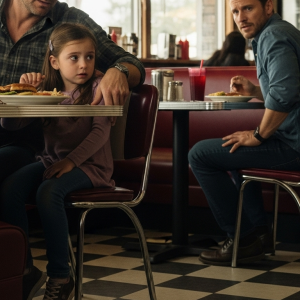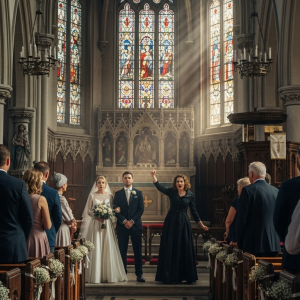My name is Eli. I’m 34, and I guess you could say I’ve always been the responsible sibling. Not the favorite, not the rebel, not the golden child—just the one who showed up on time, paid my bills, and remembered everyone’s birthday. I work in finance, live alone, and have made a career out of quiet competence. My family, well, they’re loud, close-knit in that performative way, and very good at pretending everything’s just peachy while sweeping real problems under the rug. I’ve always been sort of adjacent to the main event; involved, but never truly embraced. The kind of guy you invite to weddings but never ask to be in the photos.
Growing up, my younger brother Mason was the star. He was charismatic, reckless, and always getting himself into some kind of trouble from which he would emerge, smirking, completely unscathed. He had this charm that my parents consumed like candy. When he dropped out of college, they said he was “finding himself.” When he blew through two jobs in six months, they said he was “too creative for a corporate environment.” When he ended up moving back home at 28, they defended him as if he were a prodigal son, not a man-child avoiding responsibility.
I, on the other hand, paid my own way through school, held down the same demanding job for over a decade, and quietly helped cover part of their mortgage when my dad’s hours got cut five years ago. But none of that ever seemed to matter as much as Mason’s potential. I was the reliable, sturdy scaffolding that held up the family structure, while Mason was the beautiful, unpredictable facade everyone admired.
Still, I never really let it get to me. Or at least, that’s what I told myself. I kept my head down, sent the checks, replied to the group texts, and showed up for every holiday, smiling through the small jabs that always came dressed as jokes. “Eli, you’re so serious! Loosen up, man.” “Oh, we figured you’d be busy, Eli. You’re always working.” I took it in stride, a part of me hoping that if I just kept showing up, one day I’d be seen as part of the family, not just the one funding it from the background.
That illusion shattered last fall. It started, as these things often do, with a dinner. Mason had just gotten engaged to a woman named Brooke, who my mom had already dubbed “an absolute angel.” My parents decided to throw a big, celebratory engagement dinner at a swanky rooftop restaurant downtown—not the kind of place they could usually afford, which, in hindsight, should have been my first clue.
My mom called me a few weeks before. “Eli, sweetheart,” she said in that syrupy, affectionate tone she reserves for when she wants something. “We’d be so thrilled if you could make it to Mason and Brooke’s engagement dinner. It’s going to be such a special night.”
“Of course,” I said without hesitation. “Just send me the details.”
“And… if it’s not too much trouble,” she added, her voice dropping to a conspiratorial whisper, “we were hoping you might help us with the reservation. The restaurant needs a card on file to hold the private space. We’ll pay you back, obviously.”
I should have known right then that “we’ll pay you back” was a phrase from a language of fantasy, but like always, I agreed. I called the restaurant, booked a private section for twenty people, and gave them my credit card for the $500 non-refundable deposit. I didn’t mind. Not really. It was Mason’s night. And maybe, just maybe, this time I’d feel like I was truly a part of it
The night of the dinner, I showed up right on time, 7:00 sharp. I was wearing a dark navy suit, a freshly pressed shirt, and a pair of new cufflinks I’d been saving. I brought a nice bottle of champagne for the happy couple and even had a custom card printed with their initials. When I arrived at the rooftop, the hostess gave me a small nod and gestured toward the private section. I took a deep breath, straightened my tie, and walked in.
The space was beautiful. String lights were draped overhead, floral centerpieces adorned each table, and a soft jazz band was playing in the corner. And there they all were: my parents, Mason, Brooke, her parents, and a few of their close friends. Everyone already had drinks in hand, laughing, talking, clinking glasses.
I smiled and walked over to the main table, expecting at least a nod of recognition, a “Hey, glad you could make it.” Instead, Mason turned to me with that familiar, smug grin. “Oh, hey,” he said, his eyes barely glancing at the expensive bottle of champagne in my hand. “Glad you made it.”
Then, he pointed. His finger was aimed at a solitary, metal folding chair that had been set up off to the side, nestled uncomfortably between a large potted plant and a discreet, black trash bin.
“Sorry, man,” he said, his voice laced with a mock sympathy that was more insulting than any overt cruelty. “This table’s for family only. But there’s a spot for you right over there.”
I actually blinked. I thought he was joking, a poorly executed jab that was typical of him. I looked to our mom for some kind of intervention, but she just gave me that tight-lipped, non-committal smile she uses when she doesn’t want to get involved. My dad chuckled awkwardly and raised his glass in a silent, meaningless toast. Brooke, the bride-to-be, didn’t even look up. And then, as if on cue, a few of their friends laughed. They actually laughed.
I stood there for a second too long, the bottle of champagne suddenly feeling impossibly heavy in my hand. I wanted to say something, anything. But my throat closed up. A hot, prickling sensation washed over my ears. I felt like I was thirteen again, being deliberately left out of a group photo at a cousin’s wedding because my glasses and braces “didn’t fit the aesthetic.”
So, I did what I always did. I swallowed my pride. I walked over to the folding chair, set my bottle of champagne beside me on the floor, and sat down. Alone. I didn’t even take my coat off. A waiter came by and asked if I was with the party. I just nodded silently. He handed me a glass of water and moved on.
I sat there for almost two hours. I watched them laugh. I watched them give toasts. I watched them open gifts. I watched my brother give a long, rambling speech about how lucky he was to be surrounded by his “closest people,” his “real family.” I watched my mom tear up when Brooke called her the best future mother-in-law a girl could ask for. No one even asked if I wanted to order a drink.
Eventually, dessert came out, some kind of elaborate layered cake with edible gold flakes. The sun dipped below the Seattle skyline, painting the clouds in shades of orange and purple. And I realized, with a sudden, chilling clarity, that not a single person had even glanced in my direction for the past thirty minutes. I was a ghost at my own brother’s celebration.
Then, the check came.
I watched the waiter walk toward their table with the little leather folder. He paused, looked at the bill, then glanced down at the credit card information on file. My card. I saw him take a few hesitant steps in my direction.
“Excuse me, sir,” he said quietly, his professionalism a stark contrast to my family’s behavior. “The total for the event is $3,218. Should I run the same card for the final amount?”
Every head at the table turned to look at me. The jazz band seemed to fade into the background. My brother raised an eyebrow, a flicker of amusement in his eyes. “Oh, yeah,” he said, with a casual wave of his hand. “Eli’s got it.”
The waiter looked at me, his expression questioning. And I smiled. A calm, slow, measured smile that didn’t quite reach my eyes. My voice, when it came out, was steady.
“Not my table,” I said, just loud enough for everyone to hear. “I was told this was for family only.”
There was a silence so sharp, so absolute, it felt like the air had snapped in half. My brother’s mouth opened slightly. My mom frowned, confused. My dad sat up straighter. Brooke’s father, a stiff, quiet man, furrowed his brow.
The waiter hesitated, the bill held in his hand like a radioactive artifact. “Sir,” he stammered, “you made the reservation.”
“I did,” I nodded. “And I paid the deposit. But as you can see, I’m not with them. I’m over here.” I stood up slowly, picked up my coat, and gestured with my chin toward the trash can. “Where I belong, apparently.”
You could almost hear the collective thud of jaws hitting the floor. The waiter looked like he wanted to be anywhere else in the world. My brother looked like someone had just slapped him with a wet fish. My mother’s eyes narrowed, flickering between me and the check, her mind scrambling to regain control of a situation that had just slipped from her grasp.
“Wait, Eli,” she said, her voice low and shaky. “What are you doing?”
I shrugged, putting on my coat. “Following the seating chart, Mom. Mason said this table was for family only. I assumed that meant I wasn’t included in the bill, either.” I looked directly at the waiter. “I didn’t eat. I didn’t drink. I wasn’t welcome. So, I won’t be paying.”
“Don’t be ridiculous,” Mason snapped, his smirk finally cracking into something uglier. “It was just a joke, man. Lighten up. You always take things so personally.”
“Yeah,” I said slowly, the word hanging in the quiet air. “That’s the problem. You think everything’s a joke, as long as it’s at someone else’s expense.”
Brooke’s father gave Mason a sharp, appraising look. “You invited this man to your engagement dinner,” he asked, his voice incredulous, “and you sat him next to the trash can?”
My mother, sensing the tide turning against them, tried to intervene. “Let’s not blow things out of proportion,” she said with a tight smile. “Eli is just being dramatic. He’s always been sensitive.”
That was her go-to line. My entire life, every time I had a valid reason to be upset, I was just being “sensitive.” I almost laughed.
“I’m sorry to interrupt again,” the waiter said, his voice strained, “but the restaurant needs to process the bill.”
I turned and started to walk toward the elevator. That’s when my dad finally spoke, his voice gruff. “Eli, come on. You’ve already paid for half of it. You might as well just finish it.”
I stopped cold. That sentence—you might as well—snapped something deep inside me. I turned back. “You’re right, Dad. I did pay the deposit. I even called three different restaurants to find one with a rooftop view like Mason wanted. I ordered custom floral arrangements because Mom said fake flowers would look cheap. I paid the $500 non-refundable deposit without blinking. I showed up on time, in a suit, to support my brother.” I took a step closer, my voice low but carrying in the stunned silence. “And what did I get in return? A folding chair next to a garbage bin and a ‘sorry, family only.’ So now,” I said, looking directly at Mason, “you get to figure it out. You and your real family.”
His face was flushed a deep, angry red. “You’re making a scene,” he sputtered.
“No,” I said. “I’m drawing a line.” And I walked away. I didn’t even bother with the elevator. I took the stairs, every step pounding with adrenaline and the dizzying, terrifying thrill of finally, finally fighting back.
The fallout began before I even got home. First, a text from Mason: ‘Dude, seriously? You couldn’t have just paid and talked to me after?’ Then one from Mom: ‘You embarrassed us in front of Brooke’s entire family. Was that your goal? Revenge?’
Then, a call from an unknown number. It was Brooke. Her voice was quieter than I’d ever heard it. “Hi,” she said. “I know we don’t really talk, but… can I ask you something?”
“Sure,” I said cautiously.
“Did you really pay for everything? The deposit, the flowers… all of it?”
“Yeah,” I said.
There was a silence on the other end. “They told my dad you offered,” she said, her voice barely a whisper. “That it was your idea to contribute, as a gift.”
That stopped me cold. “I never offered,” I said slowly. “They asked. I said yes. I didn’t expect anything back, but I definitely didn’t do it for show.”
Brooke sighed, a weary sound. “Well, my dad is furious. He’s saying he never would have agreed to such an expensive restaurant if he’d known it was being paid for by someone they were going to publicly humiliate. He said Mason and your parents made him look like a fool.”
Over the next few days, the family group chat roared to life with a series of demands disguised as concerned messages. But what made it worse, or maybe better, was that Brooke’s father apparently wasn’t the type to let things go. According to a mutual friend, Mr. Whitaker had a meltdown the day after the dinner. He felt he’d been made to look like a mooch, complicit in our family’s shabby treatment of me. He said to Brooke, “If this is how they treat their own blood, what happens when you marry into it?”
The ripple effects hit Mason like a freight train. Suddenly, wedding planning was on pause. Brooke had moved back to her own condo for a “mental reset.” My mother, in full damage-control mode, sent me a five-paragraph email, the subject line simply: ‘Please.’ Nowhere in that long, manipulative letter was the word “sorry.”
Two days later, my Aunt Karen, my mom’s sharp, no-nonsense sister, called me. “I heard about the dinner,” she said. “And I just want to say one thing: good. It’s about time someone shook that tree.” She told me my mom had called her, asking her to “talk some sense” into me. “I told her you didn’t need sense,” Aunt Karen said, her voice dry. “You needed space. And that maybe it’s time they learned how to function without using you as scaffolding.” It was the first time I felt like someone in my family actually saw me.
Later that night, I got another text from Mason. ‘Bro, Brooke’s dad just cancelled the deposit on the wedding venue. Said we’re not “aligned in values.” You have to fix this.’
He still didn’t get it. He still thought I was a tool in his toolbox. So, I decided to finally fix something, but not the way he meant. I logged into the shared bank account I had set up for him a year ago when he was unemployed, the one he still used for his gym membership and Spotify. I quietly moved the remaining funds—a couple thousand dollars I had left untouched—into a new, private savings account. Then I called the bank and closed the joint line of credit entirely.
The next morning, he called me, frantic. “What did you do? My card’s bouncing! It says the account doesn’t exist!”
“I know,” I said calmly. “I closed it.”
“You can’t just do that!”
“I can,” I said. “And I did. You told me I wasn’t family, remember? You don’t get to use my money if I’m not even allowed at the table.”
He stammered, then switched tactics. “You’re just jealous! You’ve always hated that I got the attention!”
“Don’t worry, man,” I said, a real laugh escaping me. “You’ll figure something out. You always do.” And I hung up.
A few hours later, my phone buzzed with an email. It was from Brooke. Subject line: I think we need to talk.
She wrote that the dinner had pulled back the curtain on behaviors she had previously excused. Mason had lied to her, telling her I insisted on paying, that I wanted to sit alone because I was an introvert. She had called the restaurant herself and gotten the real story from the manager.
‘I ended the engagement last night,’ she wrote. The words seemed to leap off the screen. ‘I’m not writing this to drag you into drama. I just wanted you to know that I see it now, and I’m sorry I didn’t see it sooner.’ I sat there for a long time, rereading the email, not because I didn’t believe it, but because I wasn’t used to being believed.
The next few weeks were oddly quiet. I learned through the grapevine that Mason had moved back in with my parents. Brooke had returned the ring. The perfect family facade had crumbled. Then, one Sunday morning, there was a knock on my door. It was my mom, holding a Tupperware container of lasagna like it was a peace offering. Her eyes were puffy, her usual confidence gone.
“I brought you dinner,” she said. I didn’t reach for it. “I just wanted to talk. No excuses.”
That surprised me. I let her in. She sat at my kitchen table, twisting her hands in her lap. “I owe you an apology,” she began. “I didn’t see it. Not because it wasn’t there, but because I didn’t want to see it. Mason’s always been loud. He takes up all the space. And you… you never asked for anything. You just did. I guess we started treating you like a safety net. Something we assumed would always be there.”
“That’s the thing about safety nets,” I said, my voice quiet. “People only look down at them when they’re falling.”
Her lip trembled. “Your father and I were wrong. We let Mason get away with too much. We let him treat you like you were less.” She looked up, her eyes meeting mine for the first time. “I know a lasagna won’t fix years of imbalance. But I just wanted you to know… I see it now. And I am so, so sorry.”
For the first time in my life, she wasn’t dodging or deflecting. She was just sitting there, owning it. I nodded slowly. “Thank you.”
Things didn’t magically repair after that, but they didn’t get worse. My parents started sending individual messages, short and respectful. My mom invited me to Thanksgiving, adding, “only if you feel up to it.” I haven’t decided if I’ll go. Mason, from what I hear, is back to working part-time, living rent-free. He hasn’t reached out, and I’m okay with that.
As for me, I took that postponed trip to Spain. I read books on boundaries. I started seeing a therapist, not because I was broken, but because I realized healing doesn’t come from waiting for someone else to say sorry. It comes when you look at your own reflection and say, “You deserved better, and you finally gave it to yourself.” So no, I didn’t pay the bill that night. But I finally cashed in on years of silent debt. And for the first time in my life, I’m not sitting next to the trash can. I’m at my own table. And at this table, there is always enough room.




